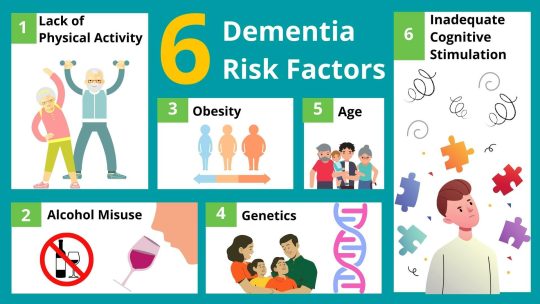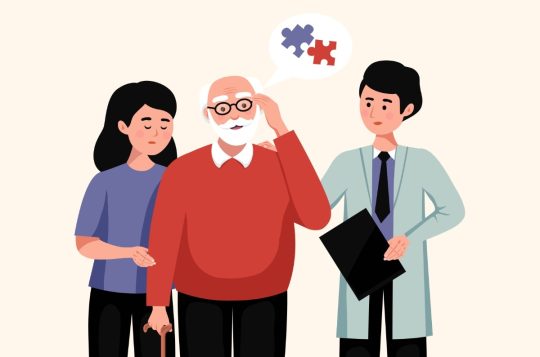Dementia is one of the biggest, emerging health concerns among older adults in Singapore. It affects one in 10 people aged 60 and above1.
As more seniors are likely to live with dementia, it’s crucial for them and their caregivers to be aware of this condition for effective prevention and management.
This article introduces you to the different types and causes of dementia, along with the common warning signs. Additionally, we will share how to get a medical diagnosis for someone experiencing symptoms of dementia.
Jump to the following:

What is dementia
Dementia is a condition diagnosed by clinicians, and is characterised by the decline of cognitive abilities such as memory, language, reasoning and orientation. It is not a specific disease, but rather a group of symptoms caused by underlying medical conditions that damage the brain.
Dementia is not a normal part of ageing. While occasional forgetfulness is natural, those with the condition usually exhibit more persistent cognitive and behavioural issues which may affect their ability to perform daily activities of living.
Although dementia is usually progressive, meaning that symptoms gradually become more severe, it’s important to note that with early detection, proper care and support, individuals with dementia often continue to live fulfilling lives.
What causes dementia
Dementia is caused by various medical conditions that damage brain cells. These damaged brain cells lose the ability to communicate normally with each other, resulting in the loss of cognitive function over time.
Dementia risk factors
Certain factors can increase an individual’s risk of developing dementia, such as:
- Lack of physical activity: Leading a sedentary lifestyle promotes the buildup of beta-amyloid plaques, which are associated with Alzheimer's disease, a common type of dementia.
- Alcohol misuse: Excessive alcohol consumption damages brain cells, and increases the risk of other medical disorders that contribute to poor brain health.
- Obesity: Being overweight increases the likelihood of getting diseases such as diabetes, high blood pressure, and cardiovascular disease, which are also known risk factors for dementia.
- Genetics: People with a family history of dementia are more likely to also be affected.
- Age: Individuals over 60 years and older are more at risk.
- Inadequate cognitive stimulation: Not having enough mental activity can lead to weakened connections between brain cells, increasing one’s risk of dementia.

What are the different types of dementia
Alzheimer's and dementia are often confused for the same thing, but they fall under distinct categories. Dementia describes an umbrella group of symptoms and disorders, of which Alzheimer's is just one specific type.
There are many forms of dementia, but four types are more commonly diagnosed in people:
Alzheimer’s disease
Alzheimer’s disease is the most common type of dementia, accounting for 60-70% of all cases worldwide.
It is caused by an abnormal build-up of proteins in the brain, known as beta-amyloid plaques and tau tangles, which lead to the death of brain cells.
The first sign of Alzheimer's disease is usually mild memory problems. As the condition progresses, other symptoms such as changes in mood, paranoia, and trouble with speech and mobility may emerge.
Malays and Indians are twice as likely to develop Alzheimer's compared to their Chinese counterparts.2 And this form of dementia is also more prevalent in women.3
Vascular dementia
Vascular dementia accounts for about 20% of all dementia cases, making it the second most common type of dementia. It occurs due to a lack of blood supply to the brain, and is often the result of diseases that damage the brain's blood vessels.
Males tend to be more susceptible to this type of dementia. Having conditions such as heart disease, stroke, high blood pressure, and diabetes also increases one’s risk of contracting vascular dementia. However, it may be possible to slow its progression by treating the risk factors.
Symptoms can range from problems with concentration and comprehension, to disorientation and difficulty with balance.
Lewy body dementia
Lewy bodies are abnormal deposits of protein that build up inside the brain’s nerve cells, interfering with their normal functioning. It forms about 5-10% of all dementia cases and affects more men than women.
This form of dementia can be challenging to diagnose as many of the symptoms are similar to Alzheimer’s and Parkinson’s disease. Individuals living with this condition tend to experience more visual hallucinations and difficulty moving around than people living with Alzheimer’s, which puts them at an increased risk of falling.4
Other symptoms include changes in mental alertness, and sleeping disorders characterised by excessive gesturing and talking in one’s sleep.
Frontotemporal dementia
Frontotemporal dementia, also known as Pick’s disease, occurs when abnormal proteins clump up in the frontal and temporal lobes of the brain, causing nerve cells to die.
Because these areas of the brain are responsible for regulating behaviour and language, people with this type of dementia often experience challenges with speech, and may engage in inappropriate or compulsive behaviours.
Frontotemporal dementia represents 5-10% of all dementia cases. It is more frequently diagnosed in individuals under the age of 65, particularly those aged between 45 to 65 years old.
Common symptoms of dementia
Being aware of dementia symptoms can help caregivers keep track of their loved one's progression and better understand when their behaviour is a result of the condition. Here are some common symptoms to look out for:
Memory loss that affects day-to-day activities
We all forget things occasionally, but those with dementia often experience persistent memory loss that disrupts their ability to function normally, such as getting lost in familiar places, or forgetting names of loved ones.
Misplacing items
It’s common for the average person to temporarily misplace items. However, individuals with dementia often misplace their belongings in unusual locations, such as putting a wallet in the oven.
Difficulty performing familiar tasks
Routine tasks, such as dressing, counting money or showering, which most of us can do with ease can become challenging for persons with dementia.
Poor or decreased judgement
Individuals living with dementia often lack the ability to exercise sound judgement and cannot recognise bad decisions. For instance, they may eat mouldy food, or make inappropriate comments or gestures to others.
Issues with orientating time and place
People with dementia may have trouble with the concept of time, confusing night and day, meal times and even bedtime. Furthermore, they may also struggle to navigate familiar places like the grocery store or their neighbourhood.
Changes in mood, personality or behaviour
Dementia can cause erratic changes in disposition, including agitation, emotional detachment, and socially inappropriate behaviour in public.
Impaired problem-solving and planning
Those with dementia often have difficulty with instructions, and may grapple with completing simple tasks like planning a meal, or adding up a bill for their purchases.
Loss of interest in social activities
Changes in parts of their brain that control social behaviour and communication can cause those with dementia to lose interest in socialising Additionally, other symptoms of dementia, such as confusion or memory loss, can make social situations overwhelming, leading them to avoid the activities and social engagement they once enjoyed.
Problems with speech and communication
A person with dementia may have difficulty speaking and following a conversation. They may repeat themselves, jumble up their words, or use inappropriate language. In advanced stages, they may even stop talking completely .
Other conditions can mimic dementia
It's important to keep in mind that many conditions such as infection or tumours, and even medication side effects can present symptoms similar to those of dementia. Many of these conditions are treatable, so it’s best to consult a doctor for further evaluation if you or your loved ones are experiencing symptoms.

How is dementia diagnosed?
Seeing a family physician or your usual general practitioner is often the best place to start for people going through cognitive or behavioural changes.
Family physicians have a broader scope of training than a general practitioner in family medicine. They keep careful records of a patient's medical history and can identify risk factors or underlying conditions that may cause cognitive impairment, making them well-positioned to detect dementia early.
During the consultation, do:
- Talk to your doctor about your concerns.
- Prepare a detailed list of memory, speech, sleep and behavioural changes that you have observed, including the frequency and when they first started .
- Have a family member or close friend accompany you to provide details you may have overlooked.
- Inform the doctor about all medications you are currently on.
If a doctor suspects dementia, they usually refer the patient to a group of specialist doctors such as a neurologist who specialises in brain and nervous system disorders. Older adults may also be referred to a geriatrician or a geriatric psychiatrist.
You can expect some of the following tests in the diagnostic process:
- A physical and neurological exam, as well as cognitive tests to assess memory, attention, and problem-solving skills.
- Blood, laboratory and imaging tests, such as a CT scan or MRI, may be ordered to detect any structural changes in the brain and rule out other potential causes for the symptoms.
Summary
If you suspect that a loved one may be showing signs of dementia, don’t wait to seek help. Contact the family physicians at NTUC Health Family Medicine Clinic today to discuss your concerns.
Remember, early detection can make a big difference in managing the symptoms of dementia and improving the quality of life for both the patient and their caregivers!
1 One in 10 seniors aged 60 and above have dementia. (link)
2 Malays and Indians face twice the risk of Alzheimer's compared to Chinese. (link)
3 Study finds that females are more likely to develop Alzheimer’s disease. (link)
4 80% of individuals with Lewy body dementia experience visual hallucinations.(link)


